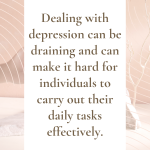Dealing with depression can be draining and can make it hard for individuals to carry out their daily tasks effectively. The challenges posed by depression can affect various aspects of a person’s life and well-being. One area that stands out as especially challenging is how depression affects work productivity, outlook, and overall performance.

When depression impacts a person, it can show in various ways, each affecting their work productivity uniquely. Symptoms like sadness, anxiety, physical discomfort, and disinterest in activities can hinder focus and efficiency at work. Acknowledging and addressing how depression influences work performance is vital to creating a supportive environment where individuals can access the necessary help and support to overcome these challenges efficiently. Additionally, make sure to check out the top signs of work burnout and what to know about mental health in the workplace.
Depression At Work

If you find yourself struggling with feelings of depression while working, please know that many others share similar experiences. It’s okay to feel sadness, anxiety, a lack of motivation, trouble concentrating, unexpected tears, or a sense of boredom while battling depressive symptoms in the workplace. Your emotions are valid, and you must recognize the range of feelings you may be going through during this challenging time.
Although a job itself doesn’t make people depressed, the workplace can make things harder for those who already feel this way. Stress levels and the help available at work can really change how depression shows up. Knowing how work affects people with depression shows just how tricky this mental health problem can be. Depression is different for everyone, and both work stuff and personal things can affect how someone deals with depression while on the job.
7 Ways How Depression Affects Work
Decreased Productivity

Depression affects work performance, making it difficult to concentrate, make decisions, and complete tasks at work. The cognitive symptoms of depression, such as persistent feelings of sadness, fatigue, and lack of motivation, create a mental fog that hampers your ability to focus on tasks and make sound decisions.
This fog slows down task completion, often leading to errors, oversights, and decreased work productivity. Recognizing and addressing these cognitive effects is essential to establishing a work environment that understands and assists individuals navigating mental health challenges.
Stress-Reducing Methodsto Restore Balance in Your Life
Absenteeism

When you are dealing with depression, you might find it challenging to gather the energy or motivation needed to consistently attend work, which can result in more frequent absences from your job. The constant battle with feelings of low energy, lack of enthusiasm, and emotional exhaustion can make it tough to maintain a regular work schedule.
As a consequence, you may find yourself missing work more often than usual due to the debilitating effects of depression on your ability to engage actively in your professional responsibilities. Addressing these struggles and finding ways to manage your mental health can be crucial in reducing absenteeism and fostering a healthier work-life balance.
Lack of Initiative

When you experience feelings of hopelessness and apathy that often accompany depression, it can dampen your motivation to proactively take charge or seek out new possibilities in your work environment. The sense of despair and disinterest can create barriers, making it challenging to show initiative or explore fresh opportunities within your professional sphere.
These emotions may hold you back from engaging actively in your job, contributing to a lack of enthusiasm and drive essential for personal growth and career advancement. Overcoming these obstacles and finding ways to reignite your passion and motivation can be key to breaking through the barriers that depression erects in your path toward professional fulfillment.
Strained Relationships

When you’re dealing with depression, it can affect how you communicate with others and navigate interpersonal relationships, posing challenges in collaborating with your colleagues and supervisors. The emotional weight of depression may hinder your ability to express thoughts and feelings effectively, impacting your interactions at work.
Difficulties in communication can lead to misunderstandings, strained relationships, and a sense of isolation in the workplace. Overcoming these challenges involves acknowledging the impact of depression on your communication skills and seeking support to enhance your ability to connect with others effectively, fostering a more positive and collaborative work environment.
Increased Errors

When you’re grappling with depression, cognitive symptoms like memory issues and a decreased attention span may emerge, potentially leading to an increase in mistakes and errors in your work. The impact of depression on your cognitive functions can make it challenging to remember details, stay focused on tasks, and perform at your best level.
These cognitive impairments can result in an elevated number of errors in your work, affecting the quality and accuracy of your output. Addressing these cognitive symptoms and finding strategies to manage them effectively can be pivotal in reducing mistakes and improving your overall work performance during this challenging period.
Physical Symptoms

When you’re experiencing depression, it’s important to recognize that it can show up in physical ways, causing symptoms like fatigue, insomnia, and other health problems that impact your ability to carry out tasks efficiently. The toll of depression on your physical well-being can result in constant tiredness, disrupted sleep patterns, and various health issues that make it challenging to function optimally at work.
These physical manifestations of depression can hinder your energy levels, concentration, and overall performance, making it crucial to prioritize self-care and seek appropriate support to address both the mental and physical aspects of your well-being.
How To Decrease Stress In Your Life: 8 Helpful Tips
Negative Outlook

When you’re battling depression, it can cast a shadow over how you view things, leading to a negative perspective that dims your optimism regarding work challenges and future prospects. The lens of depression distorts your outlook, making it hard to see things in a positive light and affecting your belief in overcoming obstacles or pursuing new opportunities in your career.
This pessimistic viewpoint can dampen your motivation, creativity, and overall excitement for your job, potentially affecting your performance and hindering your personal development. Acknowledging how depression influences your mindset is crucial in taking steps to foster a more positive and resilient outlook, empowering you to navigate work challenges with a renewed sense of hope and possibility.
Dealing With Depression At Work
The impact of depression on work performance and outlook is profound. It leads to cognitive impairments, reduced productivity, and errors, while emotional barriers affect communication and collaboration in the workplace. Moreover, depression’s negative influence can dampen optimism about work challenges and future prospects, hindering professional growth. Recognizing these effects is essential for enhancing work performance and creating a supportive environment that addresses mental health challenges. Understanding how depression affects individuals at work can guide us in establishing a workspace that values mental well-being, empowering employees to face challenges with resilience and hope.
After learning the different ways how depression affects work, make sure to stay on top of your mental well-being by reading these topics:
- How Do You Get Help For Mental Illness?
- 30+ Inspiring Quotes For Depression
- Embrace Tranquility With These 20 Uplifting Quotes For Anxiety
- 10 Tips On Handling Anxiety: Reclaim Your Life From Stressors











Leave a Reply